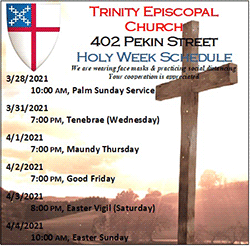Commission to call for overhaul of early childhood education funding
 Send a link to a friend
Send a link to a friend
[March 16, 2021]
By PETER HANCOCK
Capitol News Illinois
phancock@capitolnewsillinois.com
 SPRINGFIELD – A commission that Gov. JB
Pritzker appointed in 2019 will soon issue a report calling for a
complete overhaul in the way the state handles its budget for early
childhood education along with a massive increase in funding for early
childhood programs. SPRINGFIELD – A commission that Gov. JB
Pritzker appointed in 2019 will soon issue a report calling for a
complete overhaul in the way the state handles its budget for early
childhood education along with a massive increase in funding for early
childhood programs.
Speaking Monday at a hearing for a House appropriations committee that
deals with elementary and secondary education, Deputy Gov. Jesse Ruiz
said the state’s system of funding early childhood development programs
is fragmented across too many agencies, that services are unevenly and
inequitably distributed around the state and that early childhood
educators are paid far too little for many to make a living.
“All of this contributes to Illinois' low kindergarten readiness
numbers, which are especially low for children of color,” Ruiz said.

Ruiz served as a cochair of the Governor's Commission on Equitable Early
Childhood Education and Care Funding, which Pritzker established in
December 2019. The commission’s charge was to develop an innovative
approach to making early childhood education and childcare services
affordable for all families with children, from birth through age 5.
Theresa Hawley, an assistant to Ruiz who also helped staff the
commission, said its upcoming report on the matter will ask that funds
for early childhood programs be determined using a model similar to the
evidence-based system for K-12 education and for all funding to be
centralized into one state agency.
That report is due later this month.
The funding model that the commission developed considers the cost of
providing high-quality services for all children in the state.
It includes the cost of hiring teachers and staff at competitive wages,
appropriate staffing levels, food and food services, staff training and
professional development and various administrative expenses.
The commission then estimated per-child costs for services along
different age ranges and regions of the state. For example, preschool
care was estimated to cost between $15,500 and $18,000 annually per
child in areas outside the city of Chicago, while within Chicago, those
services would cost between $16,000 and $20,700.

“The funding goal that's in the report is about seven times as much as
we're spending across all of our public funding streams on early
childhood right now,” Hawley said. “It's upwards of $11 billion that has
been identified as the need that we would have in order to provide a
system that adequately pays staff and provides adequate services to all
the children across the state that that need them.”
Hawley didn’t say specifically how long it might take the state to reach
that level of funding, but she did say that much of the funding could
come from the federal government.
[to top of second column]
|

Rep. Will Davis, of Homewood, chairs a virtual
meeting of a House appropriations committee discussing early
childhood education funding. (Credit: ILGA.gov)

“We're in a really interesting moment right now where the federal
government has really stepped up to the plate and invested more in
early childhood and in child care than we've ever seen before,” she
said. “In a normal year, we might have around $6 billion of federal
spending on early childhood and child care specifically. This year
in the American Rescue Plan that just passed had $39 billion for
child care nationally. And the (federal budget) package that passed
in December also had another $10 billion. So we're in a moment of
unprecedented federal attention to this, which we're really excited
about.”
In the current fiscal year, the state has budgeted $543.7 million
for early childhood block grants, which is distributed to both
public and private entities that provide educational, health, social
and child development services to children in the state.
Pritzker’s proposed budget for the upcoming fiscal year which begins
July 1 calls for no increase in that amount, but the Illinois State
Board of Education is seeking a $50 million increase.
ISBE has said it needs the money to expand access to early childhood
programs to about 9,400 additional children. But several advocates
who spoke to the committee said they believe the money should be
used to increase pay and benefits for child care workers and
preschool workers.

Jill Andrews, president of the Southern Illinois Early Childhood
Action Team, said her organization currently pays its parent
coordinator a stipend of $178 a week and its grant administrator
$153 a week.
“Nowhere in the state would anyone be encouraged to apply for these
positions at this level of funding,” she said. “Soon the minimum
wage will catch up with the salaries we're able to offer and more
preschool-for-all programs will be shuttered due to the inability to
attract teaching staff that meet the preschool-for-all educational
requirements.”
Other people who operate community-based preschools and day care
facilities said they often lose employees who gain experience at
their facilities and then go work for school districts that offer
higher pay along with health and retirement benefits.
But Rep. Will Davis, D-Homewood, who chairs the committee, said ISBE
was specifically asking for additional funding to fill more slots in
early childhood programs, not to increase salaries and benefits for
workers, and he suggested community-based providers discuss the
matter further with ISBE.
“Not to say that both buckets aren't important buckets, if you
will,” he said. “But again, if we're talking about supporting the
State Board’s ask, well, according to our information the State
Board’s ask is to increase slots. They haven't said anything in
particular about personnel and increasing support for personnel.”
Capitol News Illinois is a nonprofit, nonpartisan
news service covering state government and distributed to more than
400 newspapers statewide. It is funded primarily by the Illinois
Press Foundation and the Robert R. McCormick Foundation. |